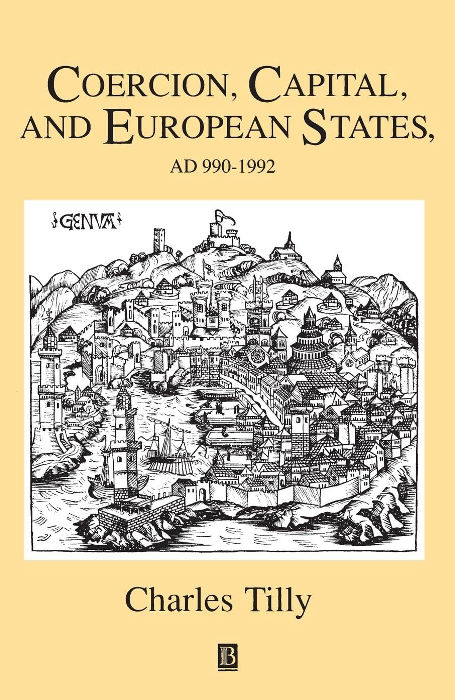Books
Charles Tilly
Coercion, Capital, and European States, A.D. 990-1990
(Studies in Social Discontinuity)
Charles Tilly’s Coercion, Capital, and European States, A.D. 990-1990 is a landmark in the study of state formation, challenging the idea that Europe’s political evolution followed a single, inevitable path. Instead, Tilly reveals a thousand-year contest between war, wealth, and power, where rulers and merchants shaped—and reshaped—the map of Europe. His provocative thesis: “war made the state, and the state made war,” with the relentless demands of conflict forging the modern nation-state. For anyone seeking to understand why Europe looks the way it does today, Tilly’s sweeping analysis is essential reading.
Tilly’s book investigates the vast diversity of European states over a millennium, arguing that previous theories fail because they overlook the interplay between coercion (military force) and capital (economic resources) and the relationships among states, not just their internal features. He contends that the rise of the modern nation-state was not a linear process but the outcome of constant negotiation and struggle between those who wielded force and those who controlled wealth. As military innovations made warfare more costly, only rulers with access to substantial capital and large populations could survive the fierce competition for dominance. This led to the development of systems for extracting resources—like taxation and conscription—which in turn built centralized bureaucracies and more cohesive states.
Tilly distinguishes between different state forms that emerged depending on the balance of coercion and capital in a given region. In merchant-dominated areas, city-states like Venice flourished, while regions with powerful landlords and little capital, such as Russia, saw the rise of centralized absolutist regimes. Where both classes were strong, hybrid forms developed, as in France and England. Over time, the pressures of war and competition pushed all these states toward the nation-state model, but with enduring differences rooted in their unique histories. Tilly’s analysis also highlights how the relationship between rulers and capitalists shaped not just the state’s structure, but also the rights and concessions citizens could extract from their governments
Coercion, Capital, and European States stands out for its ambitious scope and its willingness to question established narratives. Tilly’s core insight—that the modern state is the product of centuries of bargaining, conflict, and adaptation between military and economic elites—remains influential in political science and history. While some critics argue that the concepts of coercion and capital can be too broad to explain every nuance, the book’s grand synthesis offers a powerful framework for understanding the evolution of European states and the persistent tensions between authority, resources, and society. Tilly’s work is a reminder that the state, far from being a static institution, is the outcome of ongoing, often violent, negotiation—a lesson with enduring relevance today.

